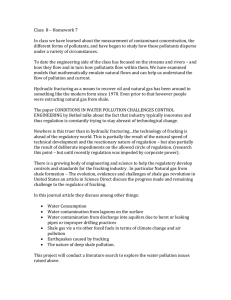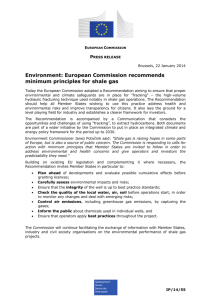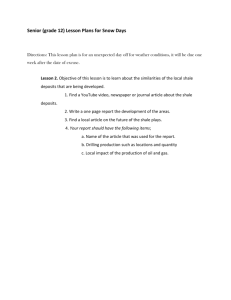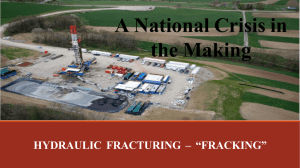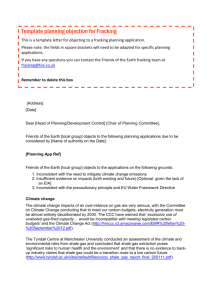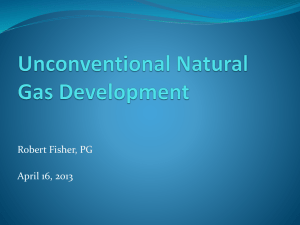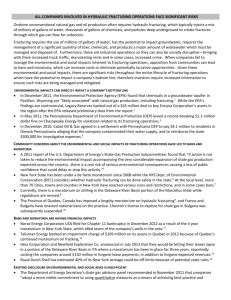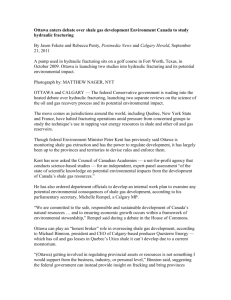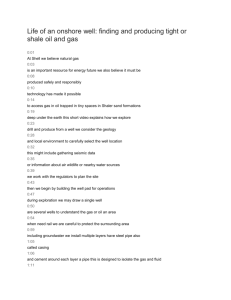Homework_8_Problem 4
advertisement
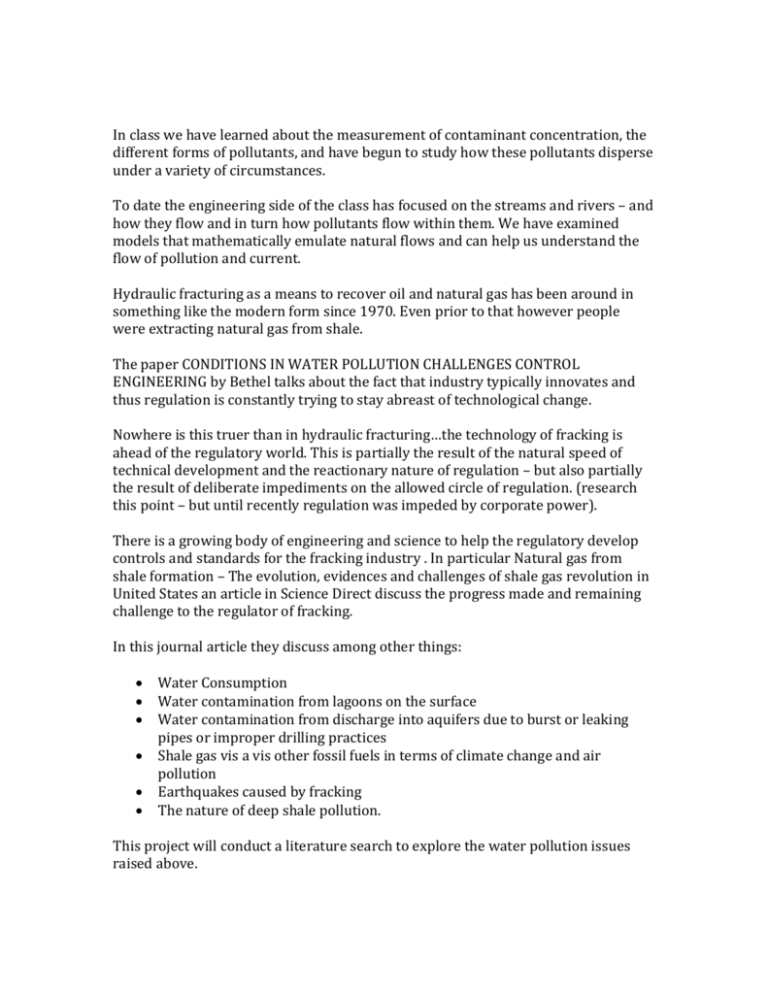
In class we have learned about the measurement of contaminant concentration, the different forms of pollutants, and have begun to study how these pollutants disperse under a variety of circumstances. To date the engineering side of the class has focused on the streams and rivers – and how they flow and in turn how pollutants flow within them. We have examined models that mathematically emulate natural flows and can help us understand the flow of pollution and current. Hydraulic fracturing as a means to recover oil and natural gas has been around in something like the modern form since 1970. Even prior to that however people were extracting natural gas from shale. The paper CONDITIONS IN WATER POLLUTION CHALLENGES CONTROL ENGINEERING by Bethel talks about the fact that industry typically innovates and thus regulation is constantly trying to stay abreast of technological change. Nowhere is this truer than in hydraulic fracturing…the technology of fracking is ahead of the regulatory world. This is partially the result of the natural speed of technical development and the reactionary nature of regulation – but also partially the result of deliberate impediments on the allowed circle of regulation. (research this point – but until recently regulation was impeded by corporate power). There is a growing body of engineering and science to help the regulatory develop controls and standards for the fracking industry . In particular Natural gas from shale formation – The evolution, evidences and challenges of shale gas revolution in United States an article in Science Direct discuss the progress made and remaining challenge to the regulator of fracking. In this journal article they discuss among other things: Water Consumption Water contamination from lagoons on the surface Water contamination from discharge into aquifers due to burst or leaking pipes or improper drilling practices Shale gas vis a vis other fossil fuels in terms of climate change and air pollution Earthquakes caused by fracking The nature of deep shale pollution. This project will conduct a literature search to explore the water pollution issues raised above. Water issues Hydraulic fracturing involves the high-pressure injection of water and chemicals into the ground to split rock apart and release natural gas. Fig. 23 illustrates a typical drilling well in the Marcellus Shale. As shown in Fig. 24, a series of challenges have been posed for protecting water resources. Indeed, much of the opposition centers on water issues caused by extraction shale gas [41,49,50,64,65,92,125,157,167,170,222,270–274].1 Large volume withdrawal water Theproductionofshale gasconsumesalargevolume of fresh-water. The amount ofwater needed in the hydraulic fracturing process depends on the type of the shale gas and the fracturing operations, such aswell depth and length, fracturing fluid properties, and fracture job design. As show in Table 6,2–4million gal of water are typically2 One way to offset the large water requirements for hydraulic fracturing is to recycle the flowback or produced water in the fracturing process [279,280]. The produced water may be treated and reused by adding additional chemicals as well as fresh water to compose a new fracturing solution. There are, however, chal-lenges associated with reusing flowback due to the high concen-trations of total dissolved solids (TDS) and other dissolved constituents found in flowback [281]. Constituents such as specific cations (e.g., calcium, magnesium, iron, barium, and strontium) and anions (e.g., chloride, bicarbonate, phosphate, and sulfate) can interfere with hydraulic fracturing fluid performance by producing scale or by interfering with chemical additives in the fluids [282]. Certainly, such large volume water, high rate of withdrawals from local surface or groundwater sources has a significant impact on local water system. However, so far, it is not clear how the large volume water withdrawals impact the local water system [113,283–285]. Structure of the paper Brief history of fracking Brief discussion of importance Conclusion – fracking is going to occur almost no matter what because of massive economic and political importance. Regulation is a risk Environmental considerations MUST be handled proactively The process of fracturing as a prelude to discussion of the risks 1 Natural gas from shale formation – The evolution, evidences and challenges of shale gas revolution in United States Natural gas from shale formation – The evolution, evidences and challenges of shale gas revolution in United States page 16 2 The risks identified to date The recommended approach to these risks Proactive steps to regulation – including working with industry. If possible review the opposition to fracking and answer the points as best I can.
